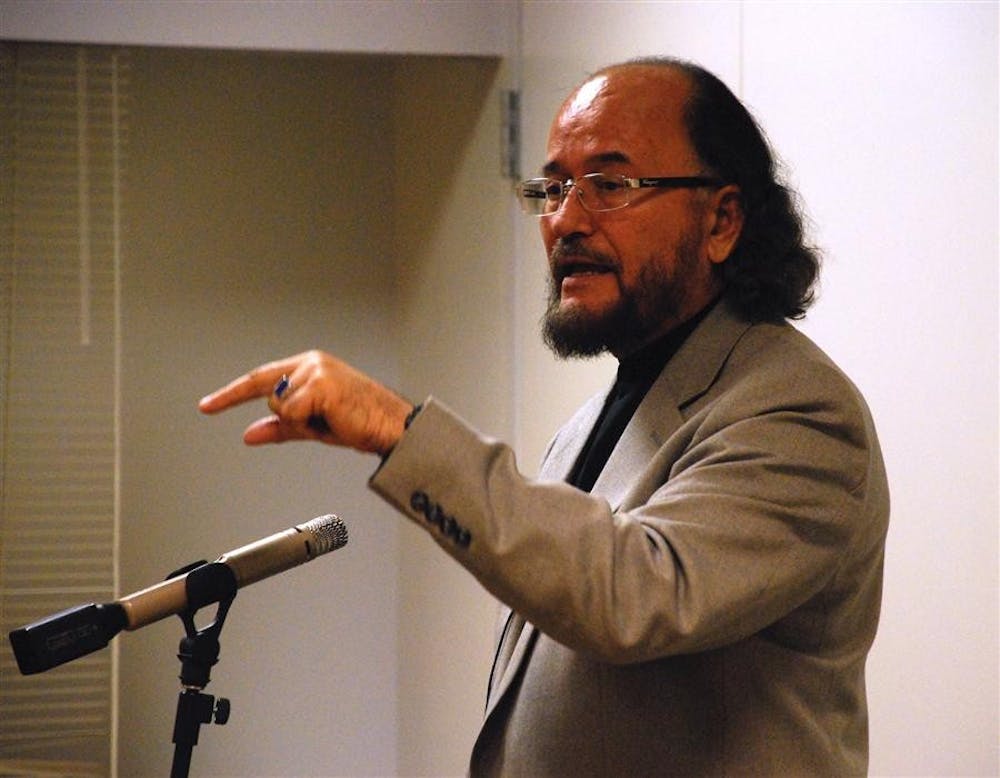Middle Eastern Studies professor Nazif Shahrani came to the United States from Afghanistan for college about 50 years ago, but when he was finished, he could not return home due to the conflict that would inundate the region for years.
He decided to become a naturalized U.S. citizen, but he worried about his family’s safety in Afghanistan. They never expressed concern for his safety living in the U.S. until the election of Donald Trump.
“There is a lot of hysteria that Donald Trump’s campaign and election have created, but we should remember this is a country that prides itself on rule of law and our constitution,” Shahrani said. “Our laws are to protect the rights of all American citizens at all times.”
In his years living in the U.S., he has become accustomed to the harassment Muslims often get due to stereotypes from events, like the war, that are occurring in the Middle East. However, he has recently seen a higher degree of negative actions toward the group. These actions can often leave Muslims in fear of what may come next.
Muslim women are some of the most targeted, Shahrani said. Due to the head scarves they often wear, they stand out as Muslims while Muslim men dressed in typical American clothes may not be so easily recognized. Freshman Hanan Mohamed, a practicing Muslim who wears a head scarf, said she has heard of a few incidents of harassment of Muslim people around Bloomington. This sometimes leaves her on edge.
“Especially after the time change and it being darker so much earlier, it’s a lot more worrisome to be walking around alone at night,” Mohamed said. “There have been stories of people who try and pull your head scarf off or different types of harassment.”
Mohamed’s youth group leader and her family were also called terrorists by a car driving past them.
Mosques have also been subject to hateful messages, Shahrani said. He said a hateful letter was recently sent to all Southern California mosques, which was not common before.
Shahrani said he believes the recent presidential election played a role in the rise of poor treatment of Muslims. While these issues existed long before Trump ran for office, Trump’s actions have allowed for more acceptance of hateful behavior. This has left many Muslims in fear of what will happen within the government.
The Islamic Center of Bloomington’s executive board has a good relationship with the Federal Bureau of Investigations, Shahrani said. The FBI often reaches out to Muslim communities with concern for their safety. Shahrani said the Muslim community can help the FBI feel at ease about Muslims in the process as well.
“We are in touch,” Shahrani said. “We have nothing to hide. They periodically contact the board. If we have concerns we also contact them.”
While some Muslim communities have open communication with the FBI, many still fear they are being closely watched and are uneasy about the possibility of a Muslim registry in the future, Shahrani said.
“It is very likely that our mail is intervened, especially electronic mail and telephone,” Shahrani said. “I certainly feel like my phone is listened to.”
While some of Shahrani’s colleagues would rather be jailed than be subject to these kinds of restrictions, he said he does not get discouraged by the possibility of someone keeping an eye on him. He has nothing to hide, he said.
Shahrani said while the harassment of Muslims in the U.S. may be rising, there are still many people willing to help and show sympathy.
The Bloomington mosque recently received a letter from a man identifying himself as a white atheist. The man said if Trump’s government creates a registry of Muslims, he would proudly register himself as a Muslim in support of the community.
Shahrani has also seen sympathy from his neighbors. One day he heard a knock on the door, and it was his neighbor with a plate of cookies in hand. She was concerned about how his family was feeling after the election.
Other women at a post-election meeting in City Hall stood up and said they would wear head scarves in sympathy if Muslim women continue to face harassment.
“It’s really nice to know there’s that sort of support group,” Mohamed said.
Mohamed said she believes the issues Muslims are facing could be solved if people take more time to understand Islam instead of stereotyping it based on groups like the Islamic State group. Islam is a religion of peace, she said.
A change must be made in the way Americans view today’s problems and foreign countries’ actions, Shahrani said. Then the problems Muslims face may be solved.
“The root of much of this problem that we have with the region is not religious — it is fundamentally political,” Shahrani said. “Unfortunately the media as well as the politicians try to make them religious problems, and that sort of gives them liberty not to talk about the political nature of these problems.”
Since he has been in the U.S., Shahrani said he strives to be a patriot, not a nationalist. He said being a patriot is standing with one’s country when its policies are morally right but also criticizing one’s country when its policies are morally wrong. This stance allowed him not to have to choose sides in the U.S. war in his country of birth, Afghanistan, he said.
“This is where we are not honest with ourselves as a country,” Shahrani said. “We need to care about the appropriateness of our foreign policy in it’s being in accordance with our fundamental values.”




